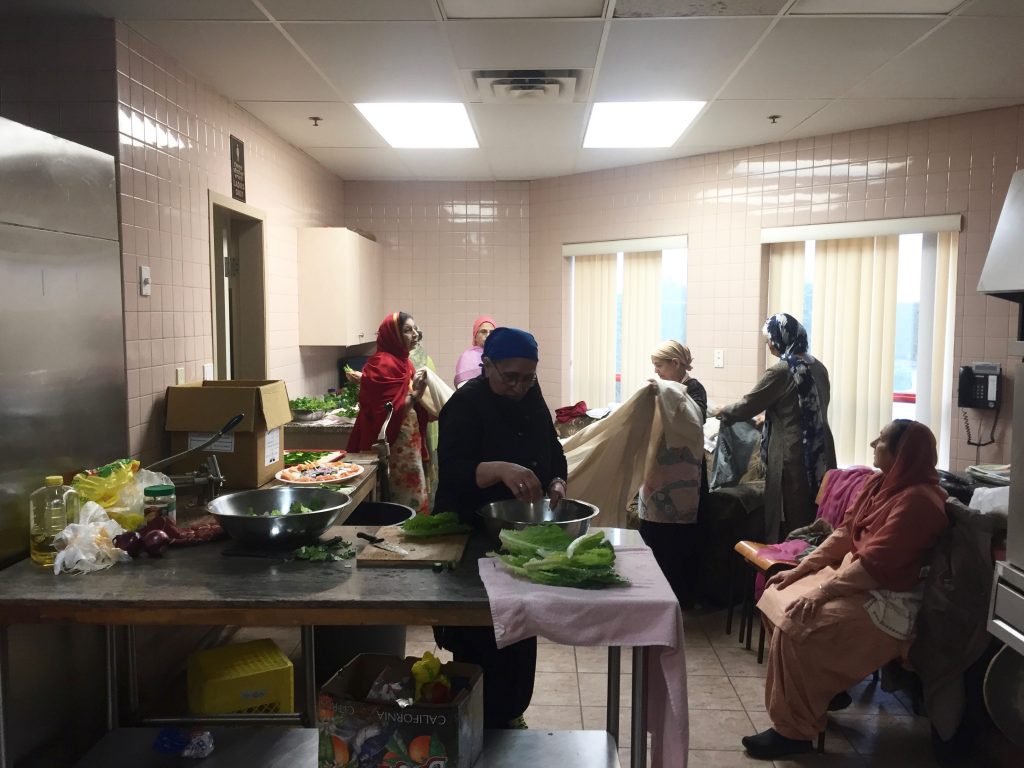 “The power of women! Together we will get things done!”
“The power of women! Together we will get things done!”
Another week has passed along with another visit to the temple. This week, a few of our group members had the opportunity to visit and observe the weekly Tuesday morning Langar preparation. By 9:00 a.m., the kitchen was filled with the shuffling footsteps of the kitchen ladies, the precise beating of knives against the chopping boards, and the aroma that filled the room was enough to make us hungry.
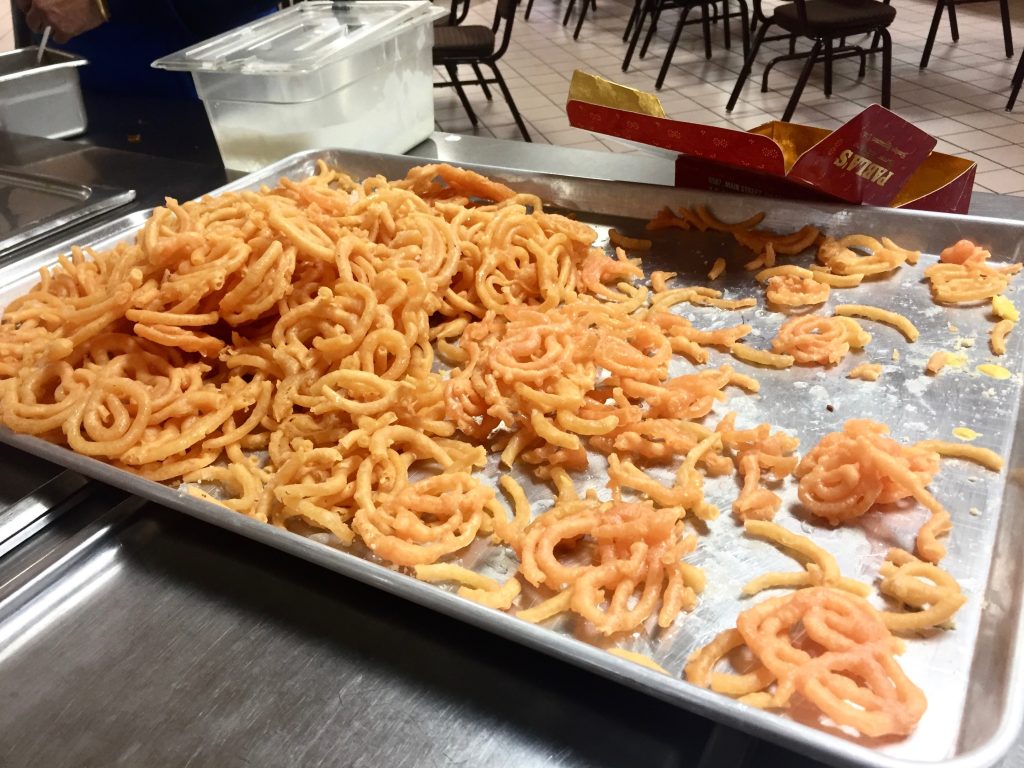
~I can still hear the crunch from when I bit into these delicious Jalebi (sweets)~
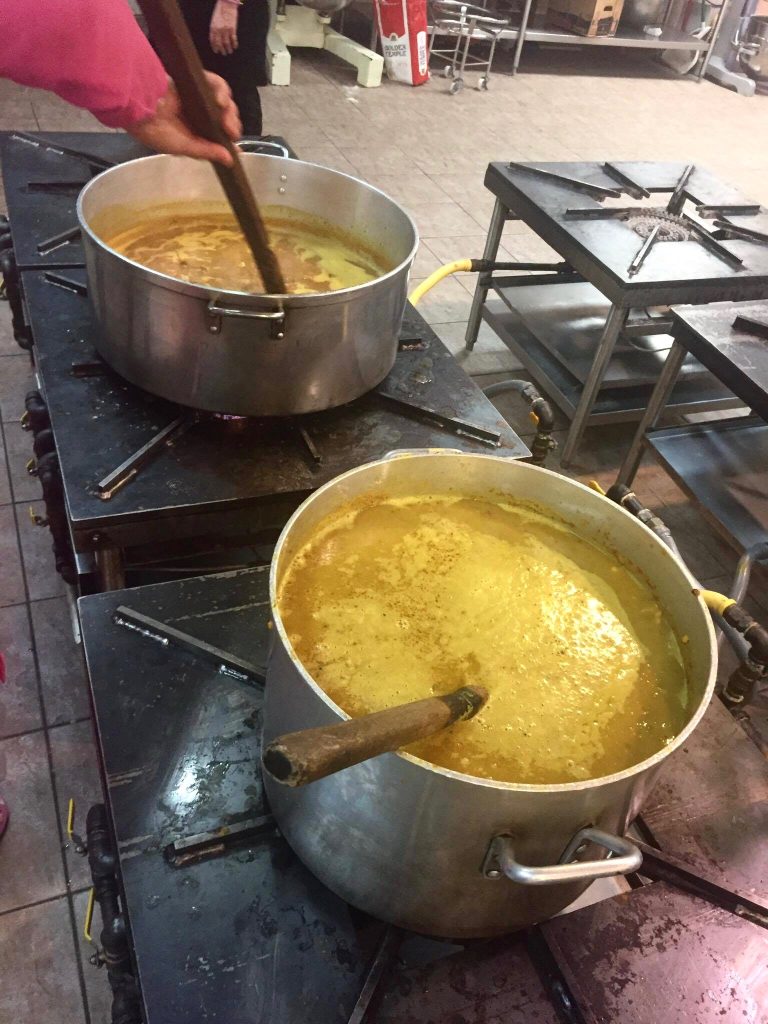
During this visit, we were also lucky enough to interview one of the community partners and gained knowledge on how the kitchen works. Through observations, we also managed to get a glimpse of how the kitchen stations were set up to increase efficiency as well as observing which ingredients were used in the prepared meals. Working in this environment was no stranger to these ladies, they were quick on their hands and feet and the food was already done and ready to be served at 12:00pm.
Weekly Objectives:
Following our previous blog post, here is the weekly objectives and achievements since blog post #2!
Week 6
Objectives
Achievements
|
Week 7
Objectives
Achievements
|
Week 8
Objectives
Achievements
|
Reflection of Moment of Significant Change
During the tutorial session in week 7, a “Moment of Significance” workshop was held. It allowed our group to reflect on our knowledge, skills, emotions, and significant changes that were experienced throughout the project thus far. These elements were represented on two graphs created in class.
Knowledge/Skills vs. Time
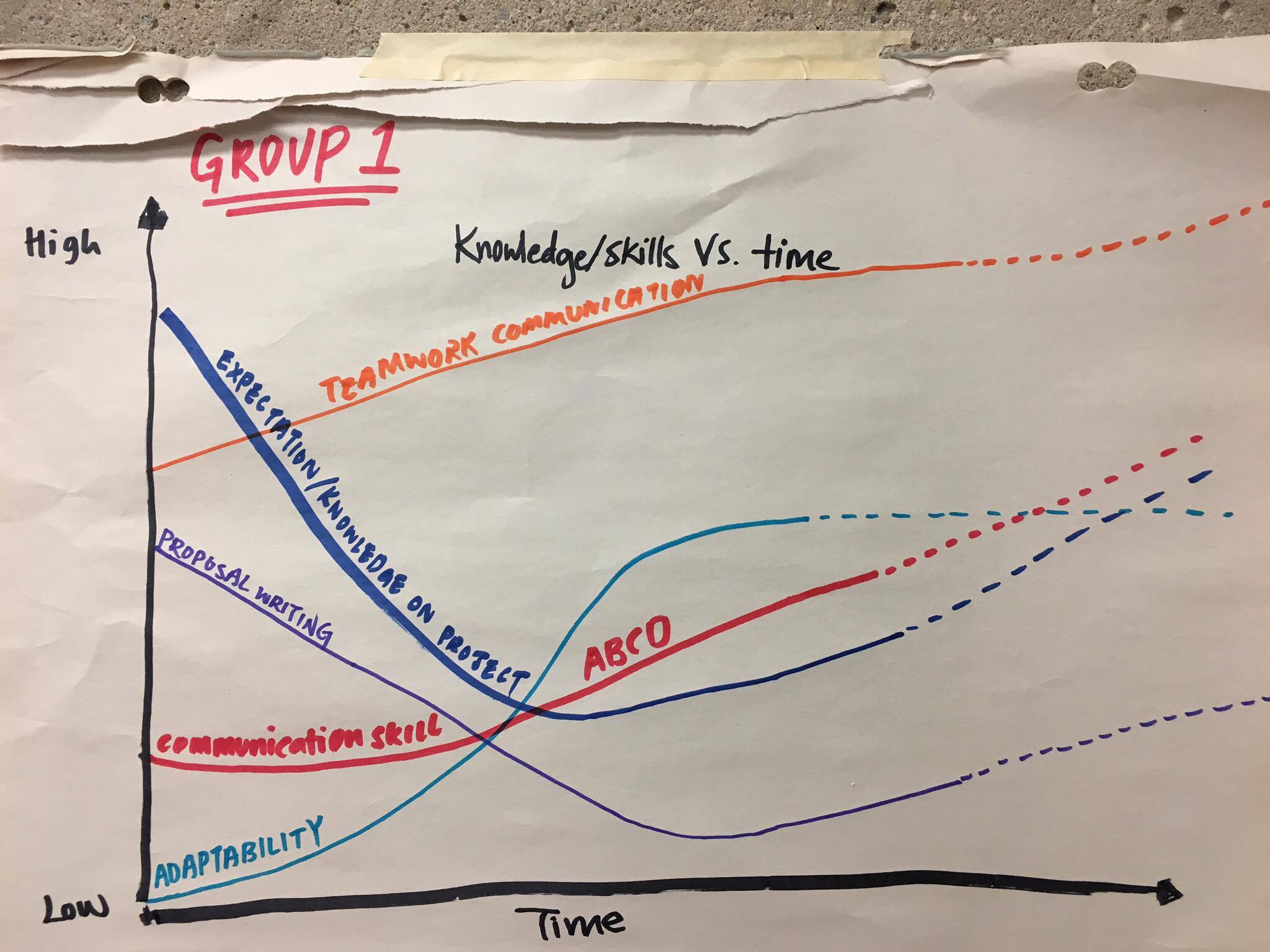
This graph depicts the change in specific skills and knowledge as the term has gone on. The leftmost side of the graph represents the beginning of the semester, the middle represents the present time and the dashed/dotted lines toward the right hand side of the image represent our estimated future projections for each skill or trait.
Teamwork & communication:
Meeting as strangers who would work as a team on a pre-determined project created some initial anxiety, but we were all relatively excited to work together and had a successful first meeting and interaction. We were quick to set goals and discuss expectations with one another, stressing communication as the most important factor. Communication became vital to ensure the success of our team, to enable to seek help when needed and offer advice when asked. Working together by trusting one another and leveraging each individual’s strengths has helped us effectively overcome our obstacles and we hope to grow our strength as a team as the term comes to an end!
Expectations & knowledge about the project:
At first, our group was very excited about the project and we all seemed to believe that we had an idea about what we would be doing when working with the community partner. Excited by the opportunity to work in the community, we visited the temple and learned that the temple’s goals differed slightly from our own and we seemed to have completely different perceptions of the project. We had presumed we would be assigned a specific task by the temple committee to complete, however the temple members expected us to be experts on all things food-related and gave us a lot of leeway, causing us to become quickly overwhelmed. However, after a quick team debrief, some communication with our partner and a second meeting, we came to a consensus on our project proposal and are hopeful and excited for the future of our project.
Proposal writing skills:
Initially, our group had confidence in our formal writing skills and proposal outline. Though we may have had some uncertainty with the content of the proposal, we remained satisfied with our initial rough draft. However, upon receiving a page full of notes and questions on our submitted draft indicated we needed to improve and rethink our plan. This created a “dip” in this line on our graph. However, our teamwork and communication remained strong and our group worked hard to rethink our proposal and submitted a satisfactory proposal. Of course we will need more practice in the future, but… Not bad for our first ever project proposal!
Communication with the partners & implementation of an “Asset-based community development” framework:
In the beginning, our understanding of the ABCD framework was very little. This was a new concept for many of us, but after learning about the importance of this framework we hope to increase our knowledge about it and our ability to implement this in our future projects.
Adaptability & flexibility:
Our expectation going into this project was completely different from the way it turned out, so we had to be very flexible and adjust to changes quickly. We had to change our scope and learn to adopt the “ABCD” framework, making some adjustments to our ways of knowing and ways of thinking. However, we are getting better at this and hope to be even better in the future.
Emotion vs. Time
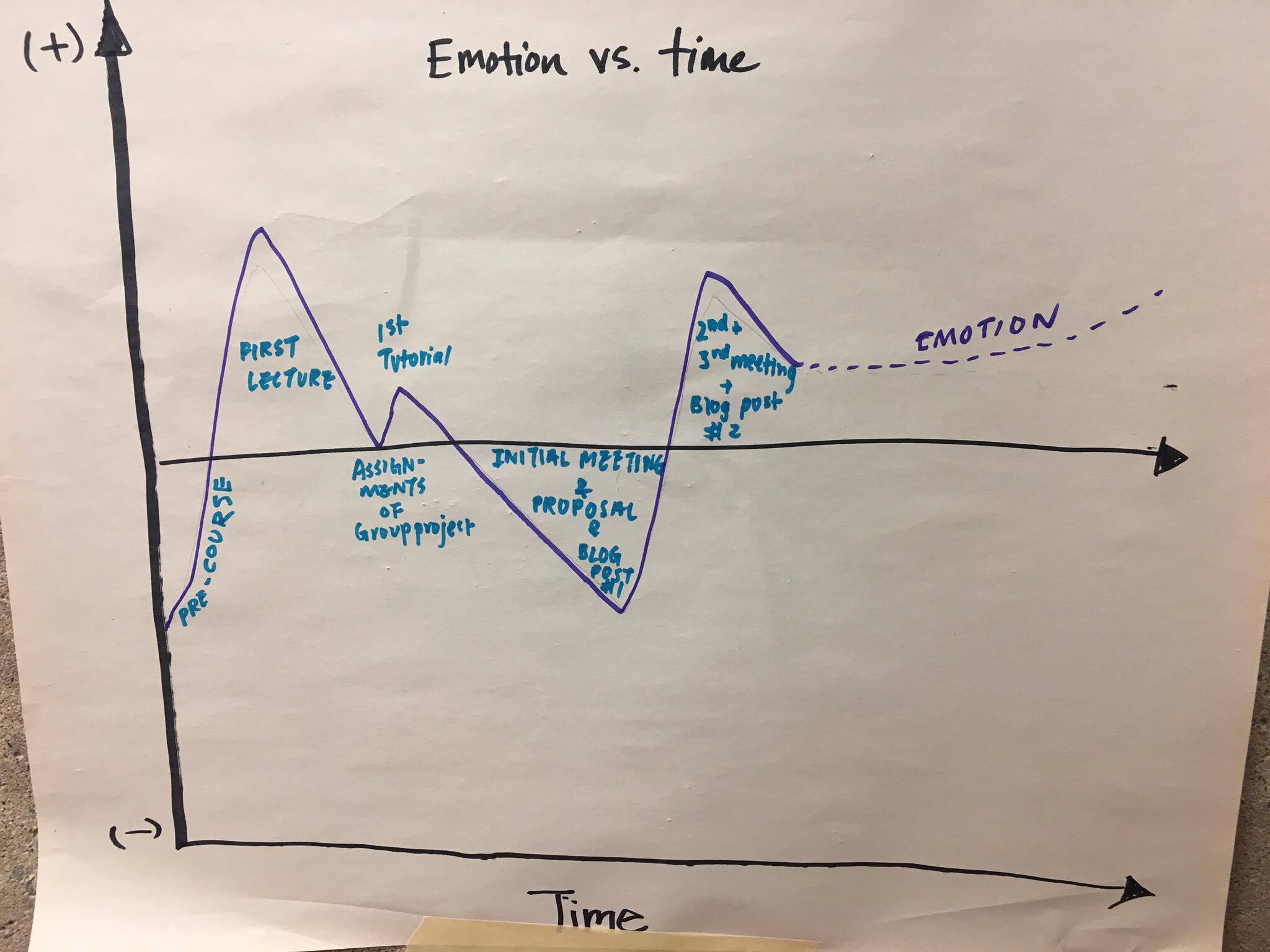
As for this “emotion vs time” graph, our group has literally and figuratively been on an “emotional roller coaster ride”. Positive emotion following positive expectations were experienced during the first couple of weeks of the course. After making our first visit to the temple and attempting to navigate our project into another direction that would ultimately work out put our group under a lot of frustration and stress. Along with the results of the first draft of our proposal and first blog post feedback, our group felt like we were at the bottom of a pit. Thanks to everyone’s patience, support and trust, we have effectively and efficiently overcome that initial emotional dip. Shortly after the second and third visit to the temple, we collected a lot of data which was a big aid to our project, and finally had a clear objective and goal as to what the temple’s goals were. Our feedback from our second blog post was significantly better than our first one, which indicated that we were starting to get the grasp of what was expected of us. These events have certainly brought our group’s emotion back to the positive side, and even in a more positive position. Overall, we have a good feeling that it will rise steady from here!
The Significance in the moment of significant change:
This activity really made us think about our project and reflect on what did this term, but what is the takeaway here? We learned a lot about the South Asian community in Richmond, we determined our role in this project, and we developed skills in proposal writing and group work, but the most important skill has been learning to adjust expectations as more information becomes available. We learned how to navigate working with a community partner and adjusting our expectations based on the community partners’ goals. This is especially relevant for our project where our community partner serves a resource for the South Asian community in Richmond and must work to meet the demands of the population they serve. As a group, I’m sure we will be able to apply this learning experience to help us navigate future academic experiences or in a job where multiple stakeholders are involved.
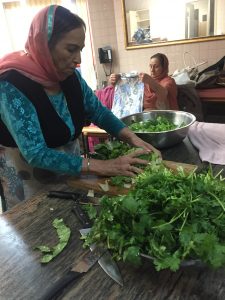
~The kitchen volunteers work independently on various aspects of the community meal preparation and then discuss to ensure the success of the overall team~
(Sounds familiar… doesn’t it?)
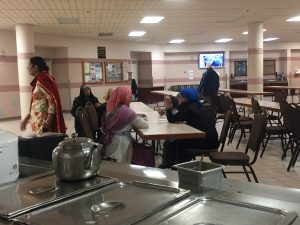
The Graceful Dismount: Strategy for Sucessful Project Completion
As the end of the term approaches our project is at it’s peak. We visited the temple kitchen to collect observations and met more stakeholders to understand the specifics of how the temple kitchen works. We now have to plan and develop strategies to help our community partners to reach their goals stated in blog post #1 and #2.
Using the information gathered from this project, we need to start thinking about our info graphic session on how we are going to send the message to the audience in a simple and informative way. We will need to distribute the workload between our team members to finish up the project efficiently. Social media such as Facebook, as well as face-to-face meet ups during flexible learning periods enable us to keep each other on track.
Here’s to a (hopefully) graceful dismount and reaching the end of the term!
Until next time, this is LFS 350 Group 1 signing off!
Look forward to our final update in our fourth blog post coming out soon.